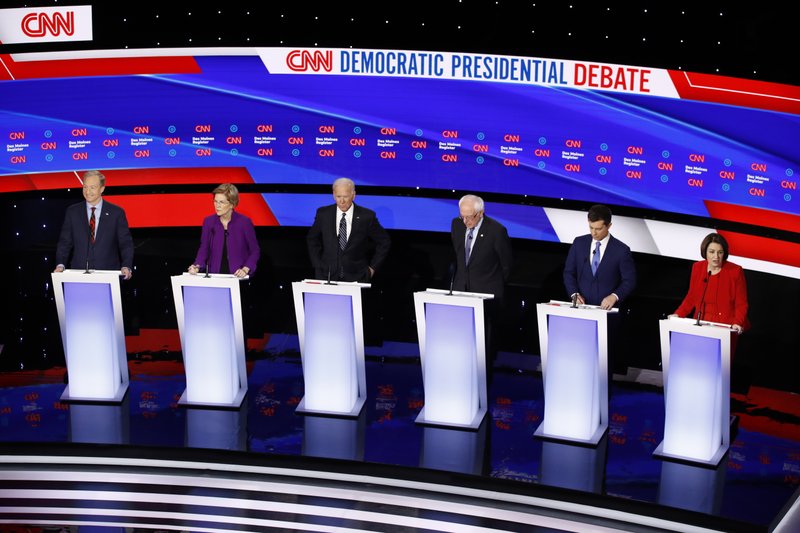The Democratic presidential field is united in lambasting President Donald Trump’s handling of America’s military presence in the Middle East, but the candidates are sharply divided on how to do it better. Their solutions range from pulling out to cutting back.
Aside from relying more heavily on allies and diplomacy, the Democrats are imprecise about ending America’s “endless wars.” They spoke in unusual detail about their Mideast policy views in Tuesday night’s debate in Des Moines, Iowa.
Sens. Elizabeth Warren of Massachusetts and Bernie Sanders of Vermont took the more aggressive stances on reducing the U.S. military role in the Mideast. Former Vice President Joe Biden and Sen. Amy Klobuchar of Minnesota called for a continued though curtailed presence. Pete Buttigieg, the former mayor of South Bend, Indiana, broadly spoke of remaining “engaged without having an endless commitment of ground troops.”
Warren says it’s time to stop asking the military to solve problems that require political solutions, including in Afghanistan, where about 13,000 U.S. troops are performing two main missions: training and advising Afghan forces in their fight against the Taliban and conducting direct combat against an affiliate of the Islamic State group.
The war in Afghanistan, which the U.S. started by invading in 2001, has lasted longer than any in American history.
“We need to get our combat troops out,” Warren said twice during the debate. In one case she was referring to Afghanistan; in the other, the broader Middle East. In neither instance did she define what she meant by “combat troops,” though she seemed to refer to those in war zones in Iraq, Syria and Afghanistan.
“Our keeping combat troops there is not helping,” she said. “We need to work with our allies. We need to use our economic tools. We need to use our diplomatic tools.”
Diplomats have tried, with some recent signs of potential success, to bring the Taliban and the Afghan government to the table to negotiate a peace deal. The U.S. military’s prevailing view is that a sudden U.S. pullout would embolden the Taliban, leave the Afghan government vulnerable and undermine near-term chances of ending the war.
Three presidents have struggled with the Afghanistan problem, starting with George W. Bush, who ordered the invasion in October 2001 in response to the 9/11 attacks by al-Qaida, which the Taliban rulers of Afghanistan had been harboring at the time. President Barack Obama campaigned on ending the Iraq War, which Bush started in 2003, but Obama saw Afghanistan as the “good war,” and he vastly increased the U.S. troop commitment there in 2009.
Biden, who as vice president had unsuccessfully urged Obama to narrow the U.S. military mission in Afghanistan to countering terrorism rather than building up the Afghan army and police, did not directly address Afghanistan during Tuesday’s debate. But speaking of the Mideast more broadly, he countered Warren by arguing that small numbers of U.S. troops are needed to patrol the strategic Persian Gulf and to “deal with” the Islamic State group, which has lost its territorial hold in Syria and Iraq but is still present in both countries and seeking a comeback.
Biden said Trump is erring by calling for a pullout from Syria.
“ISIS is going to reconstitute itself,” Biden said, referring to the Islamic State group, which emerged during the Obama years, generating combat power inside Syria and then sweeping across the border into Iraq in 2014 to grab large swaths of territory.
Asked at Tuesday’s debate how he would prevent a resurgence of the Islamic State group, Sanders pointed to allies.
“What we need to do is have an international coalition,” he said without noting that there already is a coalition of several dozen countries that are allied with Washington in countering the Islamic State group. “We cannot keep acting unilaterally.”
Trump has said repeatedly that he is getting the U.S. out of Middle East wars, but in fact he has sent about 20,000 additional troops to the region this year. In response to what his administration has called threatening behavior by Iran, Trump has added Navy ships in the Gulf and Arabian Sea, and warplanes to bases in Saudi Arabia and elsewhere. In recent days he sent about 4,000 combat troops from the 82nd Airborne Division, plus Marines, to Kuwait and other places in the Middle East to counter what he has called provocations by Iran and threats to U.S. embassies.
U.S. forces, including air and naval forces, have been based in the Middle East for decades, in part to ensure a free flow of oil from countries such as Saudi Arabia that have long been an energy lifeline. Military bases in the region host tens of thousands of American troops, including in Qatar, Kuwait, Bahrain, the United Arab Emirates and Saudi Arabia.
No Democratic candidate is calling for a total U.S. withdrawal from that region, but some of their prescriptions for improving on the Trump approach are less than clear. Klobuchar, for example, said she would leave “some troops” in the Middle East, but fewer than Trump. She would leave the roughly 6,000 U.S. troops in Iraq, “despite the mess that has been created by Donald Trump.”
Klobuchar said she would “bring our troops home” from Afghanistan, while adding incongruously, “Some would remain for counterterrorism and training.” Those are the only two U.S. military missions of significance in Afghanistan; nearly every other American troop there is in support of the counterterrorism force or the training and advising mission.
(AP)












One Response
What a bunch of hooey. None of these people have an inkling of what is happening there, not the facts that are reported in the media, nor the intelligence that is not accessible to them. All they are doing is repeating anti-Trump talking points, and that is frankly boring. It would be a better use of time and brain power to play Candy Crush. Had these been military people or otherwise involved with geopolitics, we might have a chance. But these imbeciles are addressing matters where they know nothing.